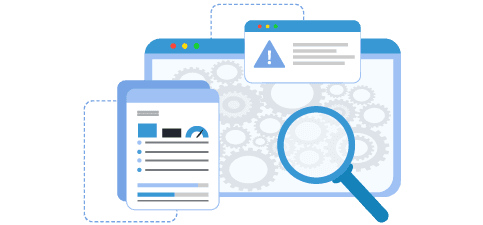Full Cycle Testing Services
We fuse our knowledge, technical competence, and experience to deliver end-to-end full-cycle testing services.
What is Full-Cycle Testing?
The term "full-cycle testing" refers to the process of involving QA specialists in the early phases of software development and continuing through the software deployment stage. QA Genesis, a renowned name in the testing world, provides full-cycle testing services for different business verticals.
Why Hire QA Genesis For Full-Cycle Testing?

Complete Transparency Throughout The QA Life Cycle
QA Genesis employs methodologies and procedures that ensure process transparency at all phases of development. We strive to be as transparent as possible with our clients. Our most significant achievement is receiving positive feedback from our clients.

Comprehensive And Intelligent Life Cycle Testing
Comprehensive testing can be carried out in various ways. For example, we know numerous clients with in-house quality assurance teams, yet the application itself was of pitiful quality. Numerous issues exist, such as insufficient QA engineer certification, checking on the top without analysis, a lack of regression testing, and verification of near-bug areas.
Before reporting bugs, the QA team must have a thorough understanding of the application logic and conduct extensive software testing with subsequent analysis of the results to avoid unnecessary risks and improve the application's quality.

Unambiguous Software Life Cycle
Clear and well-presented test results enable a customer to have a holistic view of the application's quality and to assure the development and budget control. This allows effective management decisions to be made in conjunction with our advice.

Easy Integration Into The Development Process
The QA technique that we develop, among others, is differentiated by its critical and straightforward integration into the entire development process. Our team is committed to providing courteous and culturally accepted communication continuously. Bug reports are self-contained; they include screenshots and videos that aid in the first comprehension of an issue. A developer will not have to waste time attempting to replicate an issue uselessly or proceed with the status "unable to reproduce."

A Cost-effective And Systematic Approach To QA Life Cycle Testing
It is critical to build the process and prioritize the testing life cycle effectively in software testing. We at QA Genesis check the essential aspects of the application first. This cost-effective strategy enables the development team to address significant issues more quickly. After testing the application's fundamental functioning, a QA engineer looks into more complex issues.

Take Pleasure In Working With Us
We have a reputation for being an "easy to work with" company. Try a sample project, and you'll be a long-term customer! These are not mere words; they are based on statistical data.
Got Full Cycle Testing Challenges? Tell Us About Them.

Software Testing Life Cycle
The software testing life cycle does not end with "testing" but also involves reviewing documentation, meeting with the client and development team daily, and writing bug reports.
Analyze requirements Cases
Planning tests Cases
Design and implementation of tests Cases
Reports of tests Cases
Types Of Software Testing
Category
Automated
Manual
Type
Functional
Non-Functional
Application Type
Mobile App
Web App
SDLC Stage
Development Unit
System Integration
Test Automation Testing
Requirements Testing
Prototype Testing & Usability Audit
Test Documentation Creation
Pre-Release UI
Cross-Browser & Cross-Platform Testing
Methodology
Agile Model
Spiral Model
V Model
Waterfall Model